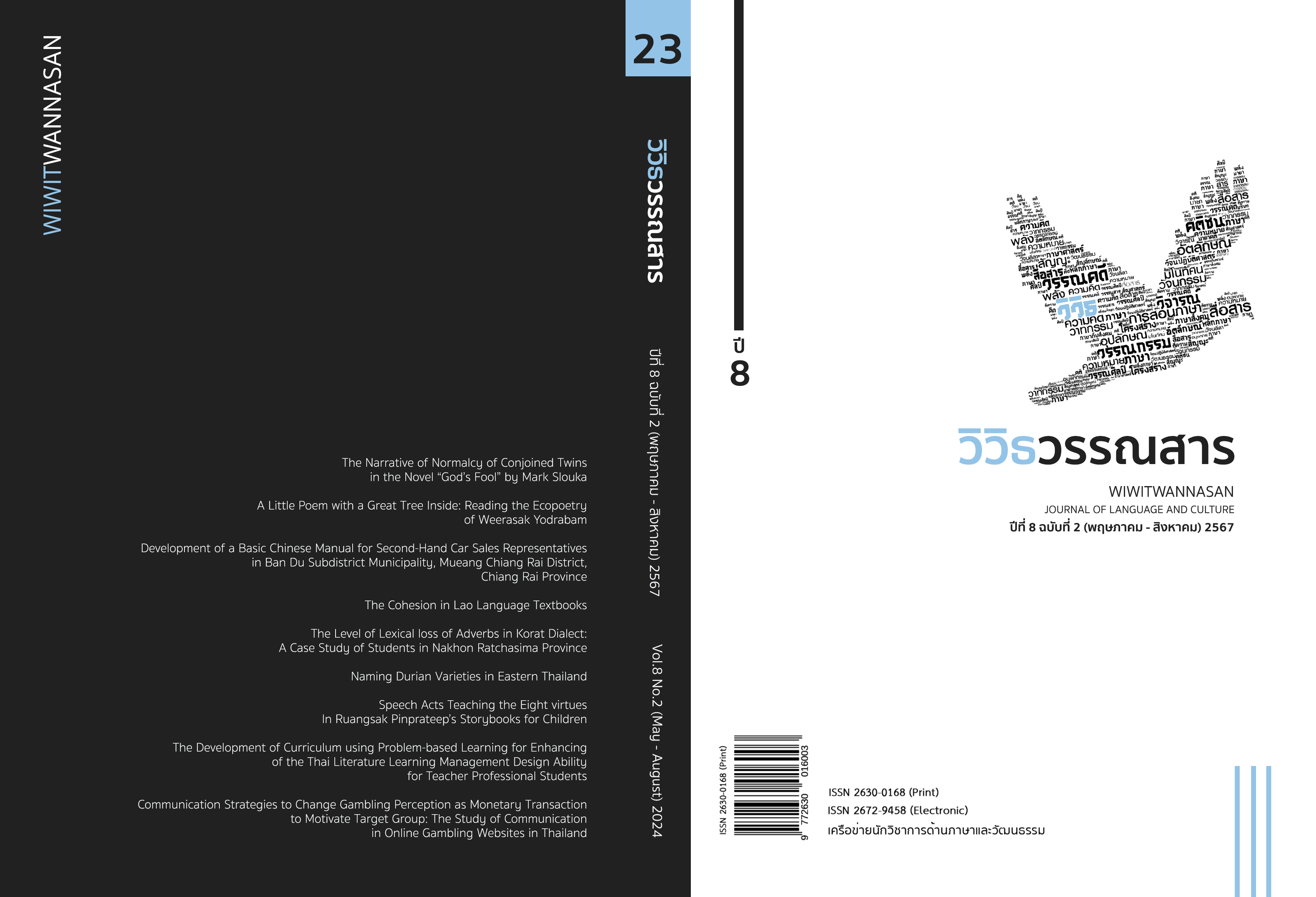การพัฒนาหลักสูตรโดยใช้ปัญหาเป็นฐาน เพื่อเสริมสร้างความสามารถในการออกแบบการจัดการเรียนรู้วรรณคดีไทย สำหรับนักศึกษาวิชาชีพครู
Main Article Content
บทคัดย่อ
บทความวิจัยนี้มีวัตถุประสงค์เพื่อ 1) สร้างหลักสูตรโดยใช้ปัญหาเป็นฐานเพื่อเสริมสร้างความสามารถในการออกแบบการจัดการเรียนรู้วรรณคดีไทย สำหรับนักศึกษาวิชาชีพครู และ 2) เพื่อศึกษาความสามารถในการออกแบบการจัดการเรียนรู้วรรณคดีไทย หลังการใช้หลักสูตรโดยใช้ปัญหาเป็นฐาน โดยเป็นมีรูปแบบการศึกษาเป็นการวิจัยและพัฒนา (Research & Development) เป็นการวิจัยแบบผสมผสานวิธี (Mixed method) ที่ใช้วิธีการวิจัยเชิงคุณภาพและวิธีการวิจัยเชิงปริมาณ กลุ่มตัวอย่าง ได้แก่ นักศึกษาวิชาชีพครู ชั้นปีที่ 3 หลักสูตรครุศาสตรบัณฑิต สาขาวิชาการสอนภาษาไทย คณะครุศาสตร์ มหาวิทยาลัยราชภัฏพระนครศรีอยุธยา จำนวน 25 คน ภาคเรียนที่ 1 ปีการศึกษา 2566 เครื่องมือที่ใช้ในการวิจัย คือ 1) หลักสูตรโดยใช้ปัญหาเป็นฐานฯ 2) แบบวัดความสามารถในการออกแบบการจัดการเรียนรู้วรรณคดีไทย สถิติที่ใช้ คือ ค่าร้อยละ (%) ค่าเฉลี่ย () ค่าที (T-Test) แบบ One Sample Test และส่วนเบี่ยงเบนมาตรฐาน (S.D.)
ผลการวิจัยพบว่า
- ผลการสร้างหลักสูตรโดยใช้ปัญหาเป็นฐานเพื่อเสริมสร้างความสามารถในการออกแบบการจัด การเรียนรู้วรรณคดีไทย สำหรับนักศึกษาวิชาชีพครู พบว่า หลักสูตรโดยใช้ปัญหาเป็นฐานดังกล่าว มี 6 ขั้นตอน ได้แก่ 1) การเชื่อมโยงปัญหา 2) การทำความเข้าใจกับปัญหา 3) ดำเนินการศึกษาค้นคว้า 4) การทบทวนปัญหา 5) การสร้างผลงาน 6) นำเสนอและประเมินผลงาน
- ผลการศึกษาความสามารถในการออกแบบการจัดการเรียนรู้วรรณคดีไทยหลังการใช้หลักสูตร โดยใช้ปัญหาเป็นฐาน พบว่า หลังเข้าร่วมกิจกรรมการทดลองใช้หลักสูตรโดยใช้ปัญหาเป็นฐาน เพื่อเสริมสร้างความสามารถในการออกแบบการจัดการเรียนรู้วรรณคดีไทย สำหรับนักศึกษาวิชาชีพครู ทำให้นักศึกษาวิชาชีพครูมีคะแนนเฉลี่ยด้านความสามารถในการออกแบบการจัดการเรียนรู้วรรณคดีไทย เท่ากับ 10 คะแนน (=10.00, S.D. = 0.912) คิดเป็นร้อยละ 83.33 ซึ่งสูงกว่าเกณฑ์ร้อยละ 75 ตามที่ตั้งไว้
Article Details

อนุญาตภายใต้เงื่อนไข Creative Commons Attribution-NonCommercial-NoDerivatives 4.0 International License.
ลิขสิทธิ์ของบทความเป็นของวารสาร การพิมพ์ซ้ำจะต้องได้ร้บการอนุญาตจากบรรณาธิการวารสาร
เอกสารอ้างอิง
Barrows, H.S. (2002). Problem-Based Learning in Medicine and Beyond: A Brief Overview. San Francisco: Josser-Bass.
Cunningham, W. G.& Cordeiro P. A. (2003). Educational leadership: A problem-based approach. Boston: Allyn & Bacon.
Gallagher, S.A. (1997). “Problem - Based Learning: Where did it come from, what does it do, and Where is it going?” Journal for the Education of the Gifted, 20 (4): 332 - 362.
Intanit, A. & Witchayapakorn, K. (2022). Research Status on Thai Literature Learning during the Years 2012-2021. Journal of Educational Research, 9 (2), 337-354. (In Thai)
KKlom-im, K. (2017). Problem-based Learning (PBL) Management: Curriculum Design and Development for Professional Teacher Education Students. Journal of Graduate Studies, Rajabhat Wilaikanya in the Royal Pages, 11 (2), 179-192. (In Thai)
Kumphiror, P. (2017). Development of Supplementary Curriculum According to Contextual Learning Approach Using Problem-based Learning to Enhance Mathematical Skills and Processes for Grade 6 Students. [Doctoral Dissertation] Sakon Nakhon Rajabhat University. (In Thai)
Khammanee, T. (2016). Teaching Methodology: Knowledge Organization for Effective Learning Processes. Bangkok: Chulalongkorn University. (In Thai)
Laorien-dee, W. (2005). Techniques and Strategies for Developing Thinking Skills: Learner-Centered Learning Management. Nakhon Pathom: Faculty of Education, Silpakorn University. (In Thai)
Ministry of Education. (2002). National Education Act A.D. 1999 as amended in 2002 (2nd Ed.). Bangkok: Office of the Printer for Governmental Organization Procurement and Supplies. (In Thai)
Rungpheungrungroj, S. (2020). Developing Thai Literature Learning Models Using Self-directed Learning and Cooperative Learning Theories to Promote Skills in the 21st Century for Grade 6 Students [Doctoral Dissertation]. Burapha University. (In Thai)
Suphanuwannich, I. (2011). Thai Language Teacher Training Program for Upper Secondary Education Level Under the Strengthening Thai Quality Teacher Project. Bangkok: Chulalongkorn University Press. (In Thai)
Thammabut, M. (2006). Promoting Thinking Processes Using PBL Strategies. Academic Journal, 5 (2), 11-17. (In Thai)
Thong-aj, C. (2018). Learning Management in Thai Language Based on Competency in the 21st Century: Theory into Practice. Journal of Education, Chulalongkorn University, 46 (1), 180. (In Thai)


